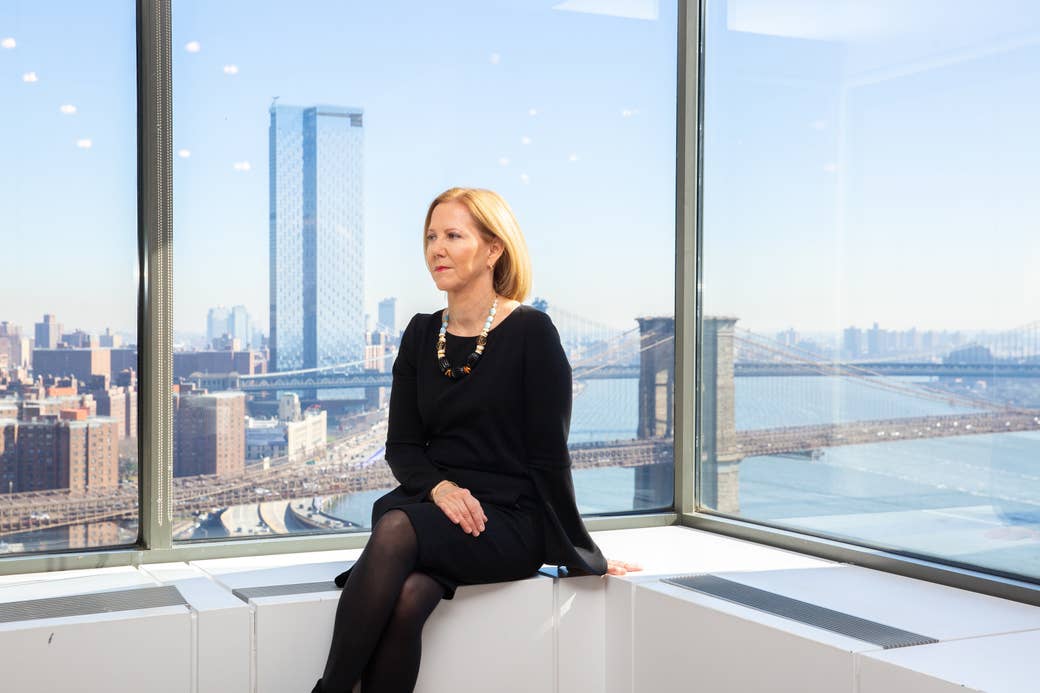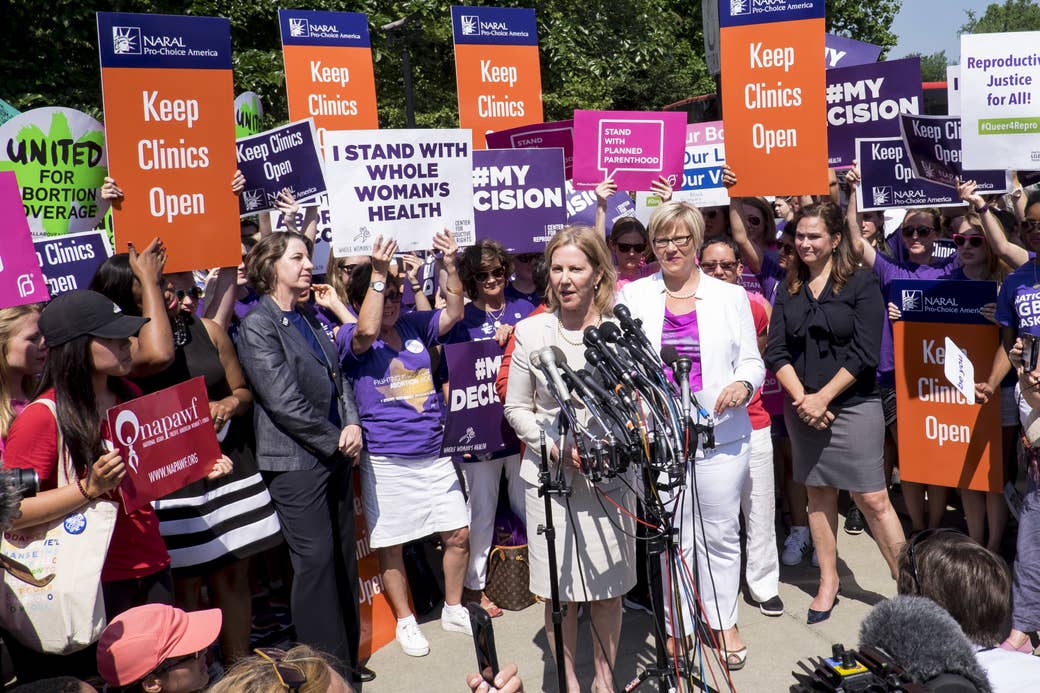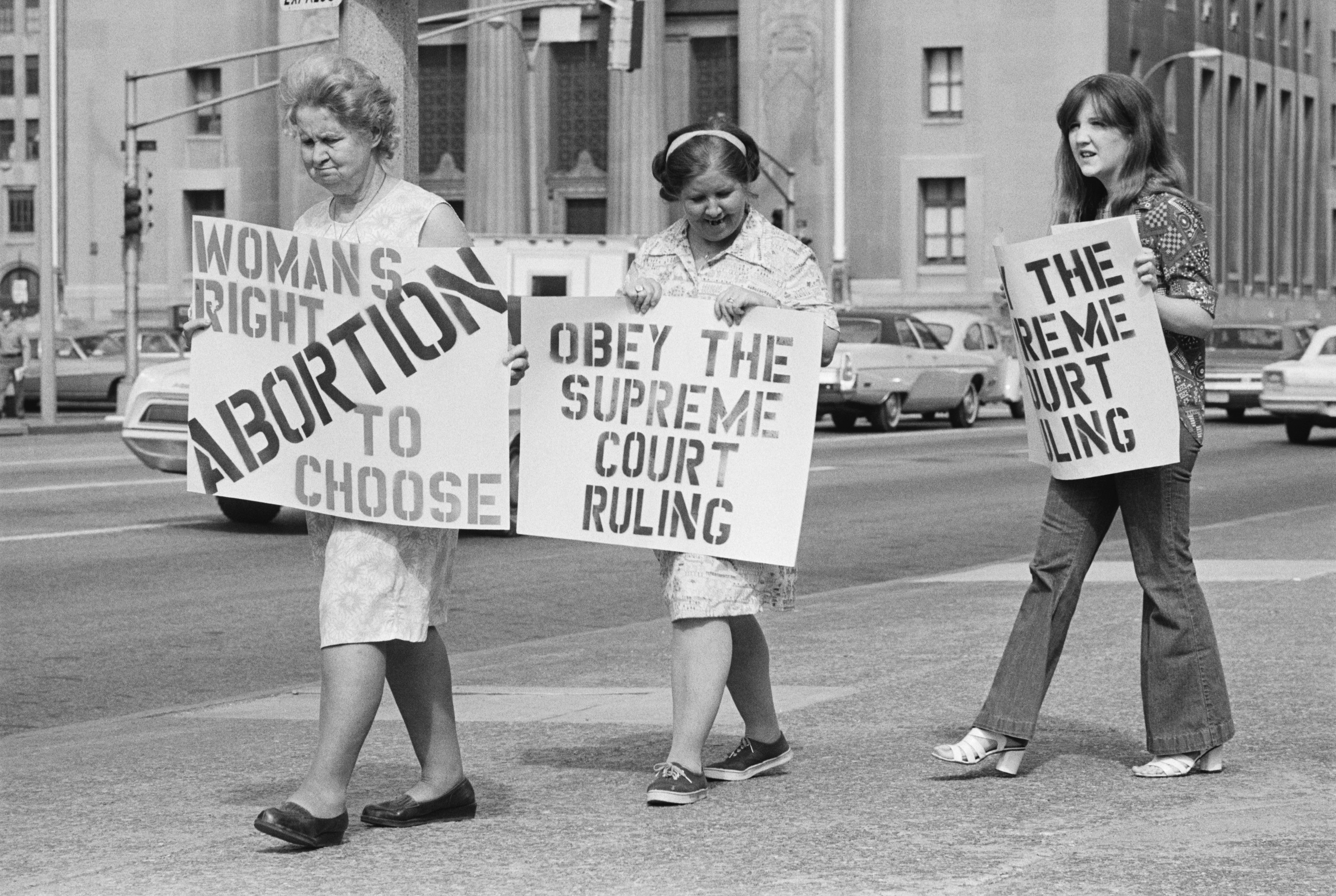
It is no exaggeration to say that the Center for Reproductive Rights was made for this moment.
Around 30 years ago, Nancy Northup, the center’s current president, was outside an abortion clinic in Baton Rouge, Louisiana, linking arms with the people around her to form a human barricade to protect patients trying to get inside. Hundreds of anti-abortion protesters faced them down, chanting, saying prayers, and attempting to block patients from entering the clinic.
Northup was just out of law school at the time and clerking for a judge in the 5th Circuit Court of Appeals in Louisiana. She had watched the fight over abortion rights reach a fever pitch in 1989, both in the courts and on the ground. Dozens of abortion clinics had been bombed or burned down in recent years. The Supreme Court, thanks to appointments made by the Republican president, was growing more and more conservative, and a recent case was just one vote short of dismantling Roe v. Wade. Though Roe survived, the court had still affirmed laws limiting access to abortion in Louisiana and Missouri.
Three decades later, Northup said, not much has changed.
“I had a frontline view to how vitriolic the battle was in Louisiana back then,” Northup told BuzzFeed News as she sat in business attire in her corner office in lower Manhattan, the Brooklyn Bridge stretching over the East River behind her.
“It’s really unfortunate that we’re here, 30 years later, and this remains such an entrenched fight,” she said.
The Center for Reproductive Rights, a major nonprofit and nonpartisan organization, focuses on bringing anti-abortion laws to court to block and overturn them before they can go into effect.
On March 4, attorneys from the center will appear before the Supreme Court to argue against another Louisiana law that could gut the constitutional right to abortion. This will be the first case on abortion to come before the conservative justices appointed by President Donald Trump, Neil Gorsuch and Brett Kavanaugh. Abortion rights advocates are nervous.
The case, June Medical Services v. Russo, pertains to a law passed in 2014 that requires doctors performing abortions to have admitting privileges to local hospitals. This requirement has proven to be unnecessary for clinics (an abortion rarely results in complications, and if one did, the patient would be admitted to a hospital regardless of the doctor’s privileges). And it’s so difficult to implement that when Texas passed a similar law, it shut down half the state’s clinics.
Many abortion-related regulations, referred to by advocates as TRAP (Targeted Regulation of Abortion Providers) laws, purport to be for the patient’s safety but in fact aim to close clinics and create barriers to accessing the procedure. But what makes this case unusual is that the Center for Reproductive Rights already argued against this law in front of the Supreme Court just four years ago— and won.
In 2016, the Supreme Court heard arguments in the case Whole Woman's Health v. Hellerstedt, a case over a nearly identical law requiring hospital admitting privileges in Texas in 2013. The court struck it down 5–3, giving abortion rights advocates their biggest legal win in decades. The court’s decision strongly reaffirmed that placing an “undue burden” on access to abortion is unconstitutional.
“Unnecessary health regulations that have the purpose or effect of presenting a substantial obstacle to a woman seeking an abortion impose an undue burden on the right,” Supreme Court Justice Stephen Breyer wrote in the court’s opinion, concluding that Texas’s admitting privilege requirement “provides few, if any, health benefits for women, poses a substantial obstacle to women seeking abortions, and constitutes an 'undue burden' on their constitutional right to do so."
With such a cut-and-dried opinion from the highest court in the country, it was a shock to the center, and advocates in general, when Louisiana’s 5th Circuit Court of Appeals — where, coincidentally, Northup got her start — let a nearly identical law stand. In the 5th Circuit Court’s opinion, Judge Jerry Smith suggested the difference between the cases is not in the two laws, which the court admitted were virtually identical, but rather between the two states. It may be easier for doctors to obtain admitting privileges in Louisiana than it is in Texas, Smith wrote (the center strongly contests this assertion).
If the Supreme Court overturns Whole Woman’s Health, it would be a green light for states with anti-abortion legislatures to pass similar laws, closing down clinics and potentially making the procedure totally inaccessible in their states. While it is theoretically possible the justices could use this case to entirely overturn Roe v. Wade and completely undo the national right to abortion, as some advocates fear, it is much more likely that the court would instead give states the ability to regulate abortion until Roe only exists on paper.

The center was created to fight a case like this. In 1992, lawyer Janet Benshoof founded the organization to represent Planned Parenthood of Southeastern Pennsylvania in one of the only other major Supreme Court cases on abortion to be decided in the past three decades: Planned Parenthood v. Casey. In that case, the center argued against Pennsylvania laws that required a married woman seeking an abortion to provide a signed statement indicating she notified her spouse, required minors to notify their parents, required patients to wait 24 hours between appointments to get an abortion, and required doctors to read patients scripts that were often inaccurate or opposed to abortion.
The center, then called the Center for Reproductive Law and Policy, won the case 5–4, but it was a bittersweet victory. The court upheld Roe and struck down the spousal-notification law but allowed the rest of the restrictions to go into place. That decision has enabled the success of hundreds of TRAP laws nationwide in the two decades since, which have closed dozens of clinics, limited abortion access, and kept the center busy in the courts.
Northup took over as the center’s president and CEO in 2003. During her tenure, she has significantly built up the organization, expanding the team from around 55 staff members to hundreds, with around 800 lawyers around the world doing pro bono work for the center. Since Northup started, the organization’s operating budget has grown from around $6 million to $40 million, and the center is often thought to be on par with Planned Parenthood and the American Civil Liberties Union, two reproductive rights legal giants.
"Never have I been as concerned as I am today about the promise of Roe being hollowed out for the women in this country."
In 2016, when the center helped deliver a major Supreme Court win in Whole Women’s Health, the future looked bright for abortion rights. The center and its supporters thought they could soon start working to expand abortion rights rather than just focusing on repealing restrictions. Now, more than three years later, Northup is “alarmed.”
“Never have I been as concerned as I am today about the promise of Roe being hollowed out for the women in this country,” she said in an emphatic but measured voice during a hearing on the Women’s Health Protection Act before Congress in mid-February. She reiterated this thought to BuzzFeed News.
“What's alarming is the extremism of the laws that were passed in the last year, some 47 years after Roe v. Wade, that Alabama would pass a blanket abortion ban that would be signed by the governor, that other states would pass bans before women know that they're pregnant,” Northup told BuzzFeed News in her office, two days after returning from Congress. “Being back in the Supreme Court, litigating the same issue we won four years ago — that gives me grave concern.”
Usually, legal and policy organizations like the center know for years which cases are likely to be taken up before the Supreme Court, and they have that time to prepare. When Louisiana passed the exact same hospital admitting privileges law that had been struck down in Texas, and when the 5th Circuit Court of Appeals agreed to take it up, the center thought it was a “nothingburger,” Center for Reproductive Rights Senior Counsel T.J. Tu told BuzzFeed News.
Tu had started at the center just two weeks before, and this case was his first assignment. He thought it was so open-and-shut that he asked his supervisor for more work, he said, wondering how this could possibly fill up his days. When the 5th Circuit upheld Louisiana’s law, Tu and the whole center were shocked.
“We have mined the Supreme Court jurisprudence, and there's no situation that looks remotely like this, where the court has been confronted with an identical law in such a short period of time,” Tu said. “It’s unheard of. There was no way this one was going to be the next big abortion rights case, but here we are.”
"The center has been honing its skills for decades precisely so that they can be ready for a moment like this."
The center quickly snapped into action, putting what is normally a decade’s worth of work into a case that would be argued in just one year. Eight days away from the Louisiana law going into effect, the center rushed to the Supreme Court to request an emergency stay. The lawyers were told by prognosticators they had no chance of getting it, Tu said, but it was their Hail Mary pass.
“Stays in general are rare. You only really see them in the movies,” Tu, who will be arguing the Supreme Court case alongside the center’s senior director, Julie Rikelman, told BuzzFeed News. You need the assent of five justices to get a stay, the same number you need to win a case — but to the center’s surprise, it was granted, the law was blocked, and clinics were prevented from closing. This gave the center a sliver of hope that the Supreme Court, even with its new conservative majority, might rule on its side.
“The center has been honing its skills for decades precisely so that they can be ready for a moment like this,” Tu said.
As if this weren’t enough, the center was then thrown another curveball when Louisiana’s legal team entered a last-minute petition to the Supreme Court. The brief argued that the center and the abortion clinic it represents, June Medical Services, shouldn’t even have the ability to sue the state over abortion laws, and that the only people who should be able to sue are the patients themselves.
That argument could threaten the very core of how the center (and other organizations, like Planned Parenthood and the ACLU) functions. Since its inception, the center has mainly represented clinics suing state governments on behalf of their patients in order to block anti-abortion laws.
People seeking abortions in states that are hostile to the procedure often only have a matter of weeks between finding out they are pregnant and being able to get an abortion. The law requires the plaintiff to be pregnant when they file the suit. Without organizations like the center joining clinics to file suits on their patients’ behalf, very few lawsuits challenging anti-abortion laws would be filed.
“It would be devastating for us and other organizations that litigate” if the Supreme Court were to agree with Louisiana on this issue, Northup told BuzzFeed News. Tu agreed, saying that the vast majority of the cases they are currently working on would be thrown into turmoil. “It would instantly create an earthquake,” Northup added.
Louisana’s ask is not entirely out of the blue, getting rid of third-party standing for abortion clinics has long been a strategy pursued by anti-abortion organizations, and Supreme Court Justice Clarence Thomas even argued against it in his dissent in the Whole Woman’s Health case.
Still, the center’s lawyers said they are hopeful.
“The Supreme Court has recognized third-party standing for almost a hundred years, and it's done that in a number of cases — not just abortion,” Rikelman, the lead attorney on the case, said in a press briefing in mid-February. The practice has been repeatedly affirmed by the Supreme Court, and if it were overturned it could have wide-reaching effects for cases outside of the abortion sphere, including, for example, gun sellers suing over Second Amendment rights on behalf of their customers or teachers suing on behalf of their students.

Despite the feeling of emergency permeating the center in the weeks leading up to the Supreme Court hearing, the court’s decision — which will likely come in late spring or early summer — is in no way predictable. Nothing has changed about the effects of admitting privilege laws since the 2016 Whole Woman’s Health decision, the attorneys from the center said. Chief Justice John Roberts, now considered the court's swing vote, joined the dissent in Whole Woman's Health, though attorneys from the center insisted this does not necessarily indicate what his vote will be this time around.
The only thing that’s changed is the makeup of the Supreme Court and who occupies the White House.
It is in the court’s interest to appear above politics, above the whims of a presidency, no matter how difficult doing so may be, the attorneys emphasized. Flipping their own decision in such a short amount of time would undermine that.
“I have to feel hopeful, or I can’t get out of bed in the morning. ... As soon as I said that I was like, ‘Oh, we’re fucked.'"
“I have to feel hopeful, or I can’t get out of bed in the morning,” Janice Mac Avoy, a prominent member of the center’s board of directors, told BuzzFeed News over the phone. “[The justices] literally protect our freedoms. They’re the last bastion protecting us against tyranny, and I just hope they take that seriously.”
Mac Avoy paused for a moment and began to laugh. “As soon as I said that I was like, ‘Oh, we’re fucked,’” she said.
No matter what happens, the center has a plan. For one, there’s the Women’s Health Protection Act, the bill Northup testified to Congress about this month. The bill — which the center first spearheaded in 2013 during the Obama administration and now has more than 150 Democratic cosponsors — would essentially codify Roe, making the national right to abortion law no matter what the Supreme Court decides and giving lower courts guidance on which state laws would violate federal law.
The legislation has the support of every Democratic presidential candidate and is likely to pass the House, but not the Republican-controlled Senate. But Northup said advocates are preparing the bill so they’ll be “ready to move” if Democrats take back the Senate and the White House.
The center has also turned more attention to the states, working to pass legislation and challenge restrictive laws in state courts, to get the right to abortion enshrined in state constitutions even as it is degraded federally.
But Northup’s moon shot, she told BuzzFeed News, is to get an equality amendment in the US Constitution that would protect abortion rights as well as prohibit discrimination.
“If I have to go out of my career the way it came in, if I have to doorknock for the rest of my life, I’ll do it,” Northup said. “But you don't give up. There is always, always another route to go.” ●
